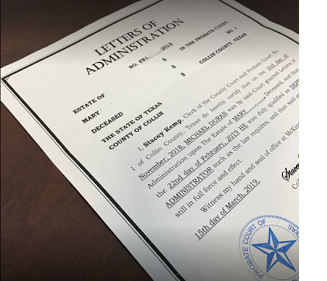How do you get Letters Testamentary?
Letters Testamentary are obtained by filing a formal application with the court having jurisdiction over the decedent's estate. It is a bit of a process but not entirely that difficult.
Getting Letters Testamentary often starts with a will. A family member or close friend of the decedent may be clearly named as the executor in the will. The will may be on fancy paper and in a fancy binder. The will may even be notarized. Nevertheless, the person named in the will is NOT the executor until a probate court officially appoints that person as the executor. To get the court to appoint an executor, someone must first file an application.

What is in an application for letters testamentary?
An Application for Probate of Will and for Letters Testamentary contains some basic information about the case that allows the court to act. The Application contains the names of the decedent, the executor, and the witnesses to the will. It contains the decedent's residence and date of death. It also contains a very short description of the assets of the estate. Finally, the Application contains a prayer or request that the court appoint the applicant as the executor of the estate. The clerk charges a fee to file the Application.
What does the court do upon receiving an application for letters testamentary?
Upon receiving an Application, the clerk will issue a notice stating that the Application has been filed and giving some details about the Application. Most importantly, the notice will state the earliest date that the court will consider the Application. This is called the "return date" and is typically at 10am on the first Monday following 10 days from the filing of the Application. This notice is placed somewhere "on the courthouse wall" with other legal notices.
When does the court have a hearing on an application for letters testamentary?
On or after the return date, the court will hold a hearing on the Application. The hearing usually lasts five minutes or less. The witness at the hearing, usually the Applicant and executor, gives testimony similar to the allegations contained in the Application. The testimony is committed to writing in a document called a "Proof of Death and Other Facts." If the court approves the Application, the court will issue an Order Admitting Will to Probate and Authorizing Letters Testamentary.
Once the Order has been signed, the executor of the estate must meet the qualifications of serving. Typically that means the executor must take an oath to "well and truly perform the duties of the executor of the estate." If there is a bond requirement, the executor must also post the bond. Most wills prepared by an attorney waive any bond requirement. After the hearing, the executor will then go to the court clerk and purchase the Letters Testamentary that were authorized in the Order.
How do you get letters testamentary if the decedent did not leave a will?
An heir or creditor of the estate can also ask the court to issue Letters to the heir. The Letters issued to an heir not named as executor in a will are called Letters of Administration. The Application will also be substantially different. Furthermore, the court may require an heirship determination before issuing Letters of Administration. Finally, if the heirs of the estate want the court to waive bond or allow the administrator to serve without substantial court involvement, then all of the heirs of the estate will have to consent to both the waiver of bond and an independent administration.
Office Location
Michael A. Duran
13355 Noel Rd Ste 1100 LB 20a
Dallas, TX 75240
USA
Company Details
Michael A. Duran
Probate Attorney